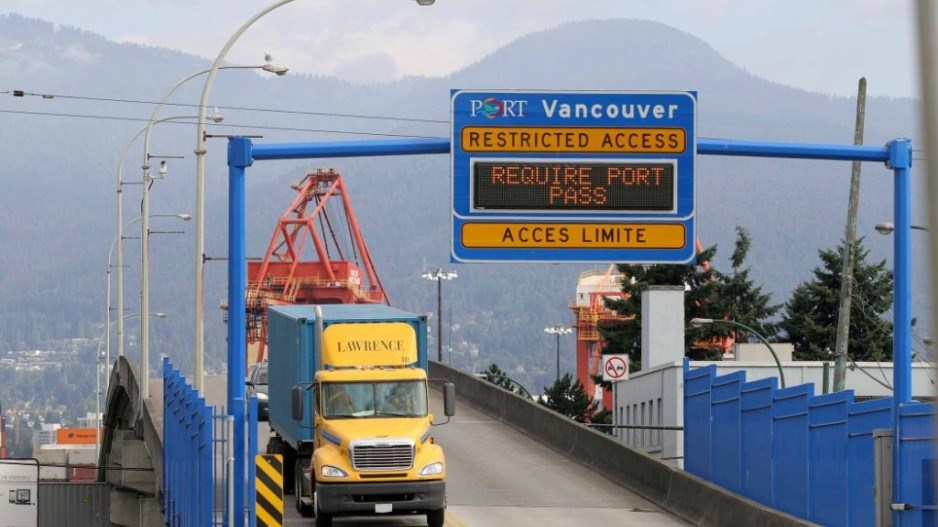Vancouver-area ports could be shut down once again by striking truckers if the province doesn’t budge on recently introduced payment rates.
“They’re very unhappy,” said Gavin McGarrigle, B.C. area director for Unifor. “All options are on the table.”
McGarrigle warned that if movement doesn’t happen soon on the file, “it could be a rocky Christmas.”
Two groups of container truckers went on strike last March for a total of 29 days: 1,000 non-unionized workers organized as the United Truckers’ Association (UTA) and 250 members of the Vancouver Container Truckers’ Assocation (VCTA), represented by Unifor.
Both groups were protesting low rates and long waiting times at terminals for which they were not reimbursed. The strike came to an end after the province, the federal government, Port Metro Vancouver and the truckers negotiated an agreement with the help of labour mediator Vince Ready.
According to that agreement, the provincial government was supposed to increase trip rates by 10% in one month’s time, as well as strengthen enforcement of rate payment and expand terminal operating hours.
But McGarrigle said it had taken the province not one, but eight months to introduce the new rate structure, and the proposed rates are not what was discussed.
“What we saw from the province yesterday was two more types of rates: trip rates for hourly drivers and hourly rates for owner-operators,” McGarrigle said.
“So now there are four hourly rates and as a result workers will lose a lot of money.”
Trucking companies can now choose whether to pay their workers by the hour or by the trip. It all works out to potentially less money for the trucker, McGarrigle said.
“For the hourly drivers who are supposed to be earning $26.28 an hour, that’s about $210 a day. This new trip rate they’ve come out with is $40 a trip with a minimum of $160,” he said.
“So if you’re a trucking company owner and you have a company driver that moves four containers a day for eight hours, are you going to pay them $210 or are you going to pay them $160? So that’s $50 a day they could be losing.”
Business in Vancouver asked B.C.’s Ministry of Transportation for an interview for this story, but did not receive a response by press time.
In February, Port Metro Vancouver will introduce a new system of permitting trucks, with the goal of reducing the number of truckers who work at the port. For several years, a surplus of truckers, many of whom own and operate their own truck, has led to rate undercutting.
Under the new system, owner-operators will have to be sponsored by a trucking company in order to get a permit to work at shipping terminals.
McGarrigle said Unifor supports those changes, but would like the port authority to include seniority requirements so that truckers who have worked the longest are most likely to get a license.
Port Metro Vancouver does not believe it is responsible for imposing such a requirement, said John Parker-Jervis, a spokesman for the port.
“The trucking company representatives expressed the need to manage their business like any other, including deciding who to employ,” Parker-Jervis said.
“But Port Metro Vancouver does anticipate that unionized trucking companies would continue to respect any bargain language [in collective agreements].”
McGarrigle said the UTA and VCTA would be meeting on December 17 and would continue to work with the province and port to find a solution.
@jenstden




